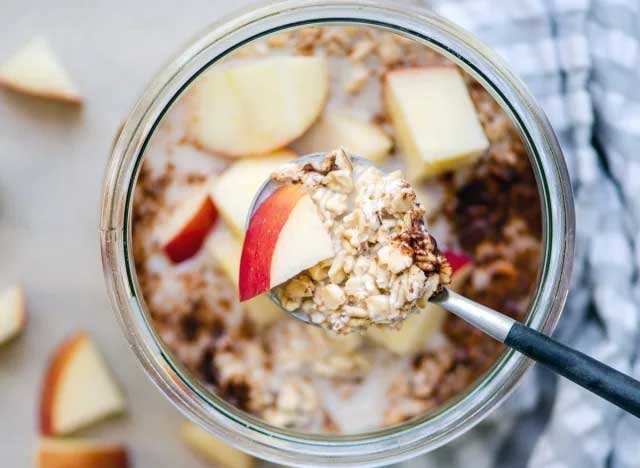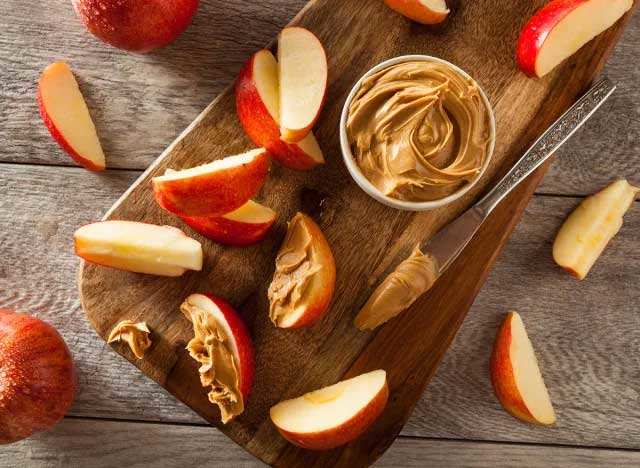It’s shocking how one small apple can affect your body!

When it comes to convenient and nourishing snacks, you can’t beat an apple. It’s a satiating option you can grab on your way out the door to run errands, or throw into your lunch bag for work. Fortunately, apples are also available year-round in the U.S. and loaded with vitamins, minerals, fiber, and antioxidants—all the nutrients your body needs to fend off viruses and other infections and ailments.
So, does an apple a day really keep the doctor away? The jury is still out on that one, but 2015 research showed that a fraction of adults who live by this healthy habit do seem to require fewer prescription medications.
Whether you prefer to nosh on this fruit whole, slice them up with almond butter, or toss them into your salads, you’ll want to know some of the following side effects apples can have on your immune system. Plus, try one of our 22 Meals to Melt Belly Fat in 2022.
The Quercetin Helps To Keep Inflammation In Check

Apples are a rich source of phytochemicals—like quercetin, which is known for its antioxidant and anti-inflammatory effects that help with regulating immune responses.
Here’s the gist of how it works. Free radicals not only damage your cells but also activate genes that trigger an increased inflammatory response. Chronic inflammation is linked to many serious diseases and health problems, but fortunately, studies have shown that quercetin can reduce markers of inflammation.
Red apples, in particular, seem to be high in this flavonoid. Also, don’t peel your apples or you’ll miss out on this health benefit—because quercetin is exclusively found in the skin.
The Flavonoids Help To Regulate The Immune System

Quercetin isn’t the only antioxidant that apples contain. They also boast a number of other flavonoids, like catechin, epicatechin, procyanidin, phloridzin, coumaric acid, chlorogenic acid, and gallic acid, which have inflammatory and immune system benefits. In fact, when compared to other popular fruits, apples had the second-highest level of antioxidant activity and the highest proportion of free phenolics.
Research has demonstrated that these types of phytochemicals regulate both inflammatory and immune responses, while also protecting the body from oxidative stress.
Keep in mind, though, that the flavonoids in apples are largely concentrated in the skin, and tend to be higher in darker red-colored varieties.
The Pectin Supports Your Gut Health

Did you know that a large portion of your immune system lies in your GI tract? That means that keeping your microbiome healthy and balanced is key to making sure your body is prepared to fight off infections. Apples can help to support gut health because they provide a specific type of soluble fiber called pectin. One 2010 study found that when women consumed two apples a day, they increased the good bacteria in their guts after just two weeks.
According to a 2019 study published in Frontiers of Microbiology, a single apple contains nearly 100 million bacteria cells. Note that the study also found that organic apples seem to have an advantage over conventionally grown apples, as they offer a more diverse array of bacteria.
The Vitamin C Fuels Processes That Protect You From Infections

It’s no secret that vitamin C is one of your body’s best defenses when it comes to warding off pesky colds and other illnesses. What you may not realize, however, is that it plays many different roles in boosting your immune system.
Studies have shown that by simply consuming more vitamin C, you can increase the levels of antioxidants in your blood by a whopping 30%—and in turn, this can help your body’s defenses to keep inflammation at bay.
A 2017 review published in the journal Nutrients found that vitamin C also strengthens the epithelial barrier against pathogens and protects your cells against environmental oxidative stress.
One large apple contains around 10.3 mg of vitamin C, which may not seem like much, but it provides 11.4% of your RDA. Plus, research has also revealed that the antioxidant activity in one serving’s worth of apples (100 grams) is equivalent to a whopping 1,500 milligrams of vitamin C.
Fun fact: A raw apple with the skin on packs up to 115% more vitamin C than a peeled one.
The Soluble Fiber Converts Immune Cells To Become Anti-Inflammatory

If there’s one thing apples have going for them, it’s fiber. One medium-sized apple offers 4.4 grams toward your RDA of 25 grams. So, what does this have to do with your immune system? A 2010 University of Illinois study discovered that the soluble fiber found in apples changes the “personality” of immune cells from pro-inflammatory to anti-inflammatory. In fact, mice who were fed soluble fiber only got half as sick as the other group, and recovered 50% sooner, after scientists induced illness in all of them. Authors of the study claim that the reason for this effect is that soluble fiber triggers an increase in the production of an anti-inflammatory protein called interleukin-4.
Important Notice: This article was originally published at www.eatthis.com by Rebecca Strong where all credits are due. Fact checked by Kiersten Hickman.
Disclaimer
The watching, interacting, and participation of any kind with anything on this page does not constitute or initiate a doctor-patient relationship with Dr. Farrah™. None of the statements here have been evaluated by the Food and Drug Administration (FDA). The products of Dr. Farrah™ are not intended to diagnose, treat, cure, or prevent any disease. The information being provided should only be considered for education and entertainment purposes only. If you feel that anything you see or hear may be of value to you on this page or on any other medium of any kind associated with, showing, or quoting anything relating to Dr. Farrah™ in any way at any time, you are encouraged to and agree to consult with a licensed healthcare professional in your area to discuss it. If you feel that you’re having a healthcare emergency, seek medical attention immediately. The views expressed here are simply either the views and opinions of Dr. Farrah™ or others appearing and are protected under the first amendment.
Dr. Farrah™ is a highly experienced Licensed Medical Doctor certified in evidence-based clinical nutrition, not some enthusiast, formulator, or medium promoting the wild and unrestrained use of nutrition products for health issues without clinical experience and scientific evidence of therapeutic benefit. Dr. Farrah™ has personally and keenly studied everything she recommends, and more importantly, she’s closely observed the reactions and results in a clinical setting countless times over the course of her career involving the treatment of over 150,000 patients.
Dr. Farrah™ promotes evidence-based natural approaches to health, which means integrating her individual scientific and clinical expertise with the best available external clinical evidence from systematic research. By individual clinical expertise, I refer to the proficiency and judgment that individual clinicians acquire through clinical experience and clinical practice.
Dr. Farrah™ does not make any representation or warranties with respect to the accuracy, applicability, fitness, or completeness of any multimedia content provided. Dr. Farrah™ does not warrant the performance, effectiveness, or applicability of any sites listed, linked, or referenced to, in, or by any multimedia content.
To be clear, the multimedia content is not intended to be a substitute for professional medical advice, diagnosis, or treatment. Always seek the advice of your physician or other qualified health providers with any questions you may have regarding a medical condition. Never disregard professional medical advice or delay in seeking it because of something you have read or seen in any website, video, image, or media of any kind. Dr. Farrah™ hereby disclaims any and all liability to any party for any direct, indirect, implied, punitive, special, incidental, or other consequential damages arising directly or indirectly from any use of the content, which is provided as is, and without warranties.








